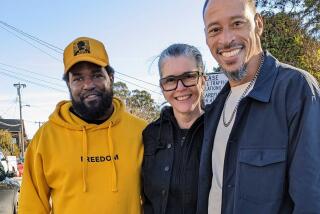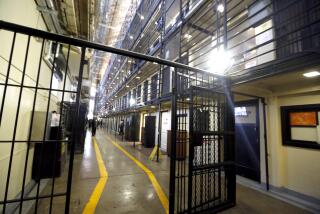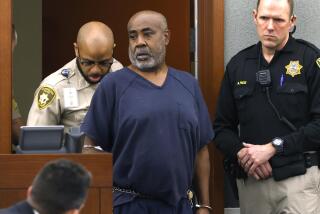Charles Manson’s ‘right-hand man’ recommended for parole
A state prisons panel on Thursday granted parole, subject to review, to a notorious killer described as a “right-hand man” to Charles Manson who was convicted in two slayings four decades ago.
It marks a rare time in recent years that the parole board has recommended freedom to a member of the Manson family.
But whether Bruce Davis, 69, walks out of California Men’s Colony in San Luis Obispo after spending more than four decades behind bars will turn on Gov. Jerry Brown, who has 120 days to review the case.
Saying he “would pose an unreasonable risk of danger to society,” then-Gov. Arnold Schwarzenegger blocked a 2010 recommendation to parole Davis. Gov. Jerry Brown had no immediate comment Thursday.
But Manson family prosecutor Stephen Kay said he was alarmed at the prospect of Davis’ release.
FOR THE RECORD:
Bruce Davis: In the Oct. 5 LATExtra section, an article about the recommendation by a state prisons panel to grant parole to Bruce Davis, a Charles Manson follower convicted in two slayings, said that Gov. Jerry Brown had 120 days to review the matter. In fact, the state Board of Parole Hearings has 120 days to review the recommendation before it goes to the governor, who would have 30 additional days to reverse, modify, affirm or decline to review the board’s decision. —
“Would you want to wake up and find Bruce Davis next door?” Kay said. “I think not.” Kay said Davis should die in prison.
In a news release, state prison officials said the panel agreed to parole Davis because of his “positive adjustment, record of no recent disciplinary problems, and for successfully completing academic and vocational education and self-help programs.”
Davis did not participate in the 1969 Manson family murders of actress Sharon Tate and six others.
He was convicted in the slayings of Gary Hinman, an aspiring musician, and Donald “Shorty” Shea, a stuntman and a ranch hand at the Chatsworth ranch where Manson and his followers lived.
Police found a Black Panther symbol at the Hinman murder scene, which prosecutors later said was an attempt to incite a race war, which the Manson family called “Helter Skelter.”
Michael Beckman, an attorney for Davis, told the Associated Press that he was “pleased and relieved” by the parole board’s decision. He added that he hopes “Bruce’s ordeal will be over.”
During his 40 years in prison, Davis became an ordained minister and earned master’s degrees in philosophy and religion via a correspondence program.
Most of the key players in the Manson murders — including Charles “Tex” Watson, Leslie Van Houten, and Patrcia Krenwinkel — continue to serve life sentences with possibility of parole. Most, including Manson, have been denied repeated requests for parole.
In 2009, Manson follower Lynette “Squeaky” Fromme was released from prison.
Manson follower Susan Atkins, who stabbed actress Sharon Tate to death more than 40 years ago, was denied parole even when she was terminally ill. She died in September 2009.
More to Read
Start your day right
Sign up for Essential California for news, features and recommendations from the L.A. Times and beyond in your inbox six days a week.
You may occasionally receive promotional content from the Los Angeles Times.






